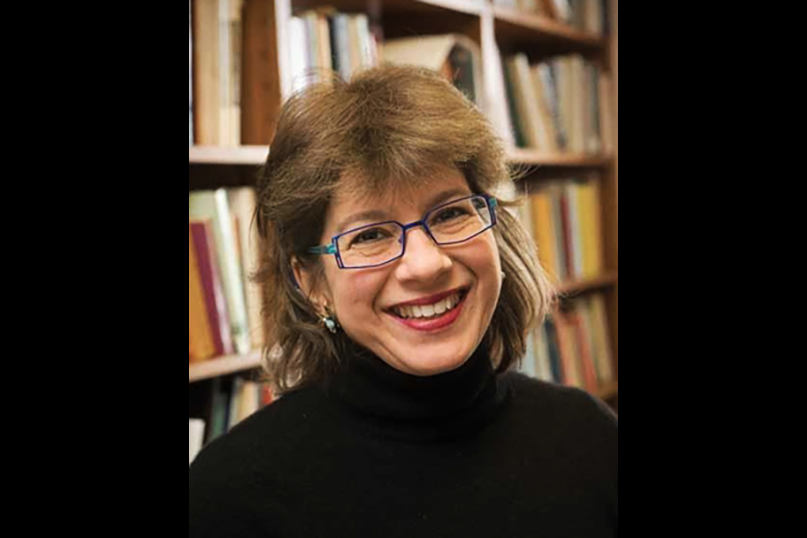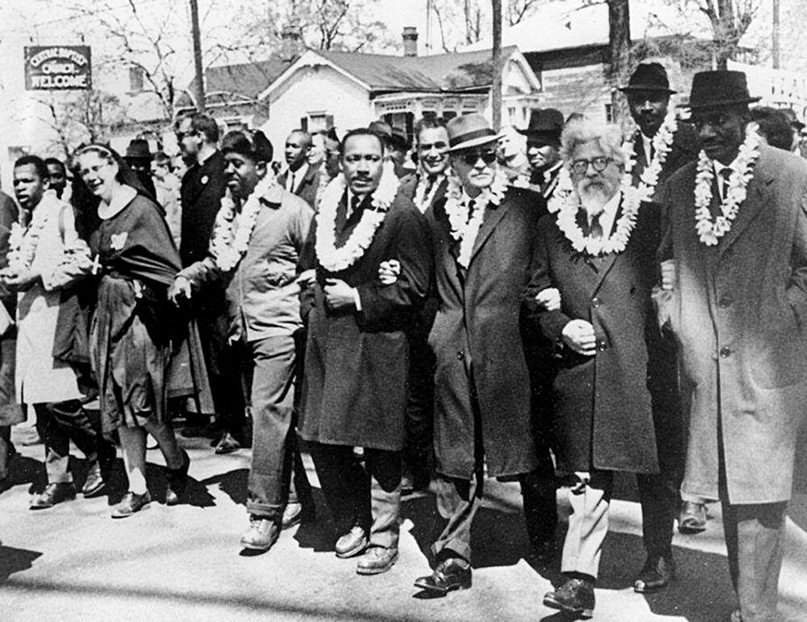
In Conversation with…Dr. Susannah Heschel
By Judie Jacobson
Susannah Heschel is the Eli Black Professor of Jewish Studies at Dartmouth College. Her scholarship focuses on Jewish-Christian relations in Germany during the 19th and 20th centuries, the history of biblical scholarship, and the history of antisemitism. She also serves on the academic advisory council of the Center for Jewish Studies in Berlin and on the Board of Trustees of Trinity College.
Her numerous publications include Abraham Geiger and the Jewish Jesus (University of Chicago Press), which won a National Jewish Book Award, and “A Different Kind of Theo-Politics: Abraham Joshua Heschel, the Prophets and the Civil Rights Movement,” which appeared in the Journal of Political Theology (Winter 2020). She has also edited several books, including Moral Grandeur and Spiritual Audacity: Essays of Abraham Joshua Heschel; Betrayal: German Churches and the Holocaust (with Robert P. Ericksen) and Insider/Outsider: American Jews and Multiculturalism (with David Biale and Michael Galchinsky).
Heschel has been a visiting professor at the Universities of Frankfurt and Cape Town as well as Princeton, and she is a Guggenheim Fellow and the recipient of numerous awards and grants, as well as four honorary doctorates. She is currently writing a book on the history of European Jewish scholarship on Islam. In 2015 she was elected a member of the American Society for the Study of Religion.
Susannah Heschel is the daughter of Abraham Joshua Heschel z”l, one of the leading Jewish theologians and Jewish philosophers of the 20th century. A prominent figure in the Civil Rights Movement of the 1960s, Rabbi Heschel was called “a truly great prophet” by Dr. Martin Luther King, Jr., and marched alongside Dr. King and John Lewis on the third Selma to Montgomery march in December 1965.

during Selma march in 1965. (Courtesy of Susannah Heschel)
Susannah Heschel will discuss “Blacks, Jews, and Black Jews” on March 18, 7:30 p.m., as part of the 2021 series of virtual lectures on the theme of “The Jewish Roots of Social Justice,” presented by the ALEPH Institute, a learning initiative sponsored by the Mandell JCC and UConn Judaic Studies.
Heschel’s lecture will explore three intertwined dimensions of relations between African Americans and Jewish Americans: Jewish involvement in the Civil Rights Movement, Jewish memory of the Civil Rights Movement in recent decades in light of the rise of white nationalism, and scholarship on racism and what they might contribute to our understanding of antisemitism.
In advance of Martin Luther King Day, which is celebrated this year on Jan. 18, the Ledger spoke with Susannah Heschel from her home in New Hampshire, just hours after Georgia elected the state’s first Black and Jewish U.S. Senators. In noting the history-making significance of the moment, Senator-elect Rafael Warnock, speaking on CNN, and Rev. Al Sharpton, speaking on MSNBC, paid brief tribute to the late Rabbi Heschel and Dr. King.
JEWISH LEDGER: It was nice to see the Black community and the Jewish community, celebrating together this morning, don’t you think?
SUZANNAH HESCHEL: Absolutely fantastic. So who knows? Maybe there’s hope. There’s always hope.
What are your memories of Martin Luther King and of your father’s involvement in the Civil Rights Movement? Did your father’s activism influence you?
I remember [Dr. King] quite well. My father met Dr. King in 1963 when they were both in Chicago at a conference, and then they just kind of bonded. They started doing lectures together at various places. And so, I met Dr. King several times and I heard him speak. He was absolutely an extraordinary person, and very very inspiring to me too.
He was a great friend of the Jewish people wasn’t he?
Yes, and Jews supported him very strongly too. There were many Jews who, as
you know, when put their lives on the line – put their lives in danger. And also raised funds for the, for the civil rights movement.
What was it that that inspired your father to become so active in in social causes especially the civil rights movement?
It certainly influenced me. My father, and also Dr. King, gave me the sense that religion and racism were absolutely incompatible. And then I became very interested in that issue when I was working on German Jewish history and saw the antisemitism that was coming also from Christian religious thinkers. That shocked me.
I think, for my father, having experienced antisemitism in Europe, growing up in Poland and studying in Germany during the Nazi period, [the notion that religion and racism were incompatible] was very important. And so, to come to the United States and find Dr. King, making the Hebrew bible, the story Exodus and the prophets, central to the Civil Rights movement was something that meant a great deal to my father.
Why do you think that Jews as a people were so active in supporting the Black community, marching with them, protesting with them. What was it that inspired us to step up and take action?
First of all, I think Dr.King made the Civil Rights movement also an ecumenical movement and brought in people from different faiths. The fact is that when he gave his public lectures, he quoted from the Hebrew bible and the prophets, as well as from the New Testament and Jesus. So he tried to be as broad as possible and as inclusive as possible.
I also think that we were as Jews, after the Holocaust, absolutely shattered. And in many ways, Dr. King restored our souls. He made us proud to be Jews; proud of the bible; proud of the prophets. He gave us a respect and a central role in one of the great religious movements of history, because the Civil Rights movement was very much a religious movement and it meant that to Jews. It meant that Judaism has something to say to the world to give the world. That was very important.
So, I see Dr. King as giving a great gift to us after the Holocaust in helping us heal our souls.
Can you explain what you mean when you say that religion and racism are incompatible and the prophets having much to teach us in terms of social justice?
Well, first of all, for the prophets, what was most important to them were the people living on the margins of society – widows and orphans, for example – that was most important to the prophets, and they were courageous figures who spoke about the importance of justice to people in positions of power – to kings, priests, but also to the entire society. They were strong voices who brought people to repent, who changed people.
As close as the Black and Jewish communities were in the 60s, it seems that relationship has deteriorated in recent years. For example, for awhile the Black Lives Movement seemed aligned with the BDS movement; several Black celebrities have in recent days spewed the hateful rhetoric of Louis Farrakhan, and so on. Is there an explanation for the fissure between the Black and Jewish communities?
I don’t see it that way. In the book by Mark Dolson for Black Power Jewish Politics, he talks about how the Black power movement emerged with black nationalism, at the same time that Jews after the 1967 War became increasingly nationalistic in relation to Israel. So in fact there’s a parallel.
He also demonstrates the many things that Black nationalism gave to the Jewish community. For instance, Black studies was established at universities. And after that came Jewish studies. I actually remember Jewish students saying, ‘Well, if you have Black studies, why can’t we have Jewish studies.’ So Black studies, in many ways, paved the way for Jewish studies, which is my field. I think that Black nationalism also made us feel that nationalism is a good thing, including Zionism.
Now, the problem with nationalism of course is that it is separate. That is, for example, Jews have our nationalism, the French have their nationalism, and so on. So, it tends to be divisive. But I think we reached that point at the same time and supported one another in our separate ways.
In terms of Farrakhan, he’s loathsome. And he has been a source of profound trouble for Black Americans and Black leaders.
It’s very hard to handle a demagogue. But then again, plenty of Jews have supported a different demagogue named Donald Trump, who has said horrible things about about a huge number of people – disabled, Black, Hispanic, etc. We’re living in an era of demagogues. We’re living in an era of racists. Now, how do I explain Jewish support for Trump to my black friends? It seems that people are drawn to demagogues. Farrakhan is just a stupid, loud-mouth person in his 80s. Trump became president of the United States.
Going forward, what can the two communities do to come together again?
We can do programs like the [the ALEPH lecture]. We can watch films like “Shared Legacies” by Sherry Rogers; we have lectures; we have plenty of books for people to read. And we have efforts to get away from demagoguery. My own synagogue, for example, established a group to study racism – an orthodox synagogue in Boston that meets every month over six weeks to read, to think, to talk. That’s how we do it.
And that’s how we, for example, change our attitudes about women and women’s right to have a profession. When I was growing up I heard people say for instance, “I would never go to a woman doctor because she would never know what she’s doing.” Now that’s changed and that’s great. This too can change.
What do you think Martin Luther King would make of the kind of rhetoric coming from Donald Trump and his followers?
Well, I think he would have been horrified. But I also think he would have been working strongly to try to change hardened hearts and soften them. I think he also always spoke with great dignity and compassion about his opponents. And he would have said, “Look, they’re human beings too. Let’s not denigrate them.” That was part of the whole idea of non-violence; not just about not fighting back, but it was about becoming a different kind of person – a person of dignity, sensitivity and understanding.
Susannah Heschel will discuss “Blacks, Jews, and Black Jews” with Prof. Susannah Heschel, Thursday, March 18, 7:30 on Zoom, as part of the 2021 series of virtual lectures on the theme of “The Jewish Roots of Social Justice,” presented by the ALEPH Institute, a learning initiative sponsored by the Mandell JCC and UConn Judaic Studies. For more information, visit judaicstudies.uconn.edu or mandelljcc.org.








 Southern New England Jewish Ledger
Southern New England Jewish Ledger









